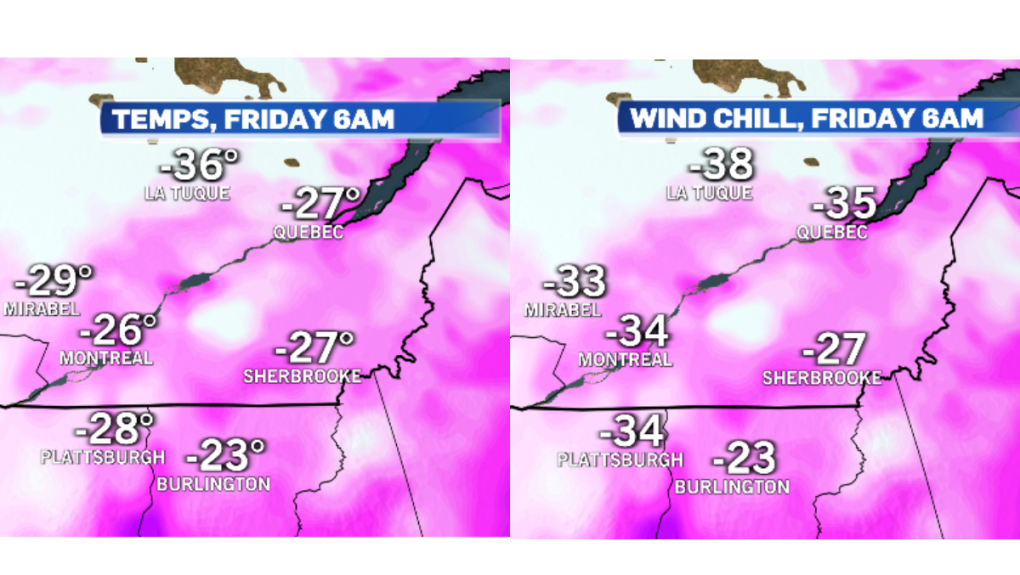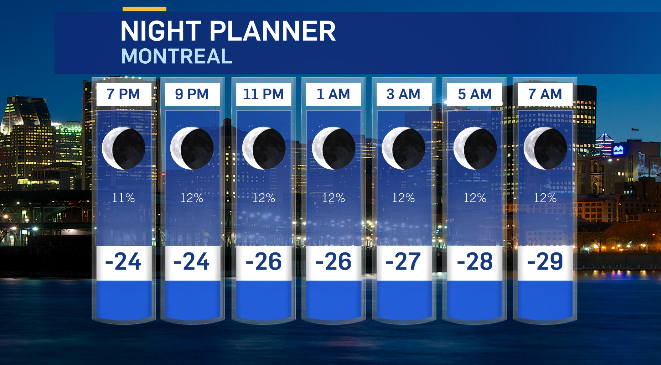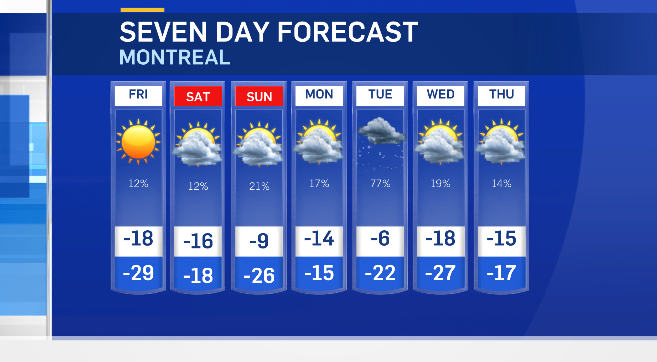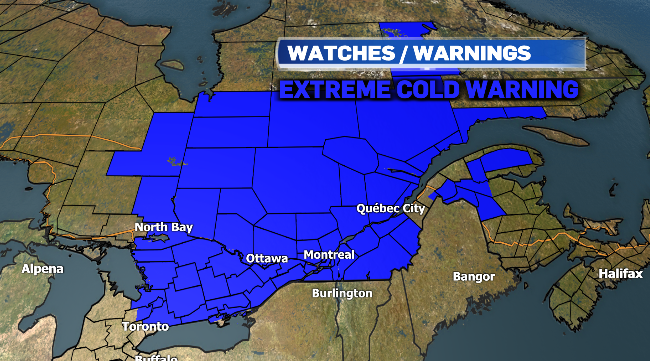Quebec under extreme cold warning as temperatures drop dramatically
Environment Canada has issued an extreme cold warning for most of southern Quebec as temperatures plunge dramatically to end the workweek.
Montrealers woke up Friday morning to temperatures of -26.4 degrees Celsius, making it the coldest morning of the season so far -- the record low for this day remains -27.5 degrees Celsius in 2005.
 Quebec temperatures versus wind chills for Friday, Jan. 21, 2022.
Quebec temperatures versus wind chills for Friday, Jan. 21, 2022.
Extreme wind chill values of -38 C to -40 C are expected to hit the province Friday night into Saturday morning.
If temperatures reach the expected -29 C on Saturday morning, it would set a new record for the day, beating the current record of -28.3 C in 1976.
"Cover up," warns Environment Canada. "Frostbite can develop within minutes on exposed skin, especially with wind chill."
The agency asks anyone working outdoors to take regularly scheduled breaks to warm up.

Extreme cold warnings are issued when very cold temperatures or wind chill create an elevated risk to one's health, such as frostbite or hypothermia.
January 2022 has been one of the coldest in the last few years, with temperatures dropping below -20 C nine times already -- compared to last year when it only happened once.

The normal high at this time of year: -6 degrees Celsius.
The normal low at this time of year: -15 degrees Celsius.
 Extreme cold warning for Friday, Jan. 21, 2022.
Extreme cold warning for Friday, Jan. 21, 2022.
-- with files from CTV News' Lori Graham
CTVNews.ca Top Stories

How quietly promised law changes in the 2024 federal budget could impact your day-to-day life
The 2024 federal budget released last week includes numerous big spending promises that have garnered headlines. But, tucked into the 416-page document are also series of smaller items, such as promising to amend the law regarding infant formula and to force banks to label government rebates, that you may have missed.
Which foods have the most plastics? You may be surprised
'How much plastic will you have for dinner, sir? And you, ma'am?' While that may seem like a line from a satirical skit on Saturday Night Live, research is showing it's much too close to reality.
opinion I've been a criminal attorney for decades. Here's what I think about the case against Trump
Joey Jackson, a criminal defence attorney and a legal analyst for CNN, outlines what he thinks about the criminal case against Donald Trump in the 'hush money trial.'
$3.8M home in B.C.'s Okanagan has steel shell for extra wildfire protection
A home in B.C.'s Okanagan that features a weathering steel shell designed to provide some protection against wildfires has been listed for sale at $3.8 million.
Diver pinned under water by an alligator figured he had choice. Lose his arm or lose his life
An alligator attacked a diver on April 15 as he surfaced from his dive, nearly out of air. His tank emptied with the gator's jaws crushing the arm he put up in defence.
Psychologist becomes first person in Peru to die by euthanasia after fighting in court for years
A Peruvian psychologist who suffered from an incurable disease that weakened her muscles and had her confined to her bed for several years, died by euthanasia, her lawyer said Monday, becoming the first person in the country to obtain the right to die with medical assistance.
Mystery surrounds giant custom Canucks jerseys worn by Lions Gate Bridge statues
The giant stone statues guarding the Lions Gate Bridge have been dressed in custom Vancouver Canucks jerseys as the NHL playoffs get underway.
Celebrity designer sentenced to 18 months in prison for smuggling crocodile handbags
A leading fashion designer whose accessories were used by celebrities from Britney Spears to the cast of the 'Sex and the City' TV series was sentenced Monday to 18 months in prison after pleading guilty in Miami federal court on charges of smuggling crocodile handbags from her native Colombia.
Wildfire leads to evacuation order issued for northeast Alberta community
An evacuation order was issued on Monday afternoon for homes in the area of Cold Lake First Nation.
































